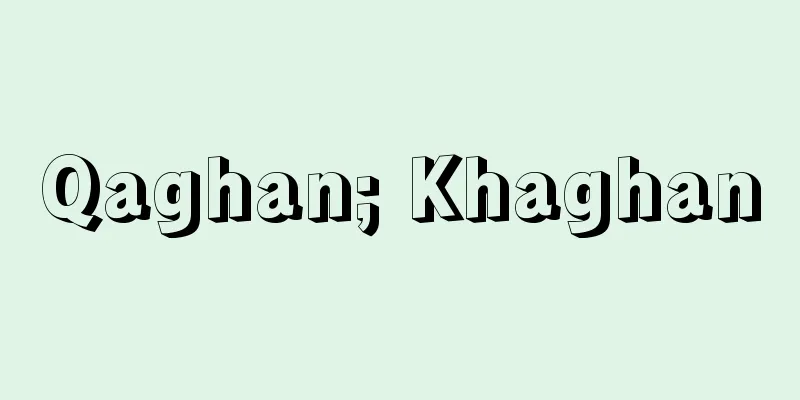Qaghan; Khaghan

|
Also read as "Khagan." A title given to the ruler of a nomadic state. It is generally believed that this title was first used by the ruler of Rouran, who unified the Mongolian Plateau in the early 5th century. The -gh- was absorbed into the previous sound, resulting in qaan, khaan, qān, khān, qan, khan (Khan, Khan, Khan, Khan). In the Islamic world, it is common to refer to a person as "Khan." Source: Encyclopaedia Britannica Concise Encyclopedia About Encyclopaedia Britannica Concise Encyclopedia Information |
|
「ハガン」とも読む。遊牧国家の君主の称号。通説では,5世紀初頭にモンゴル高原を統一した柔然の君主がこれを称したのが始りであるという。-gh-が前の音に吸収されて qaan,khaan,qān,khān,qan,khan (カーン,ハーン,カン,ハン,汗) となった。イスラム世界では「ハーン」と称するのが普通。
出典 ブリタニカ国際大百科事典 小項目事典ブリタニカ国際大百科事典 小項目事典について 情報 |
Recommend
Beggar - Kaiko
A low-class person in the Jiangsu and Zhejiang are...
Eschatology - eschatology
The meaning of the term is "teachings about t...
Section chief - Kacho
〘 noun 〙 In a government agency or company, the po...
Mount Kannabe
A mountain in Toyooka City in northern Hyogo Pref...
Soccer War - Soccer War
A war fought in July 1969 between the Central Amer...
Intraocular lenses
Also called an artificial lens, this intraocular ...
Alpinia sanderae (English spelling) Alpiniasanderae
…[Ichiro Sakanashi]. … *Some of the terminology t...
Trinitas; Trinity
A Christian doctrine that refers to the unity of F...
Hayamizudai ruins - Hayamizudai ruins
An important Paleolithic and early Jomon archaeol...
Redi, F. (English spelling) RediF
…Aristotle recognized the spontaneous generation ...
Blood Oath Incident
A series of right-wing assassinations of importan...
Adiabatic diagram - Dannetsuzu (English spelling)
A diagram used to show the thermodynamic properti...
cliché verre (English spelling) clicheverre
...Photographs belong to the broad concept of pri...
Illigera luzonensis (Presl) Merr.
An evergreen, woody vine of the family Laminaceae....
Yoshimasu Toudou
Year of death: 25th September 1773 (9th November 1...


![Kannawa [Hot Springs] - Kannawa](/upload/images/67d03c2c5cfc1.webp)






